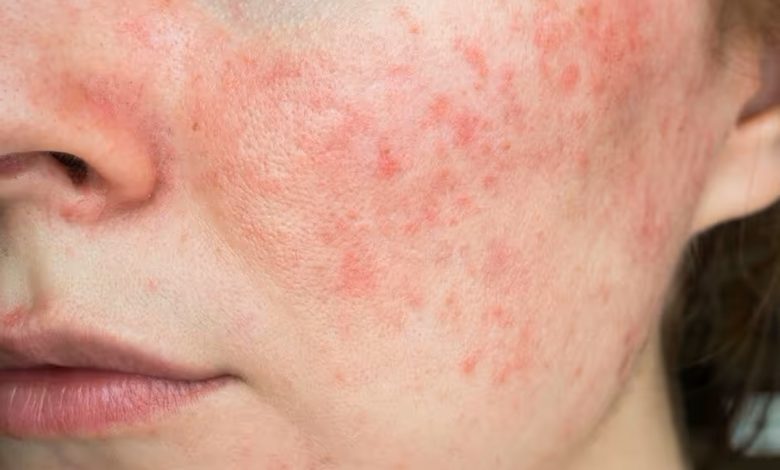5 common foods that cause skin rashes and acne

foods that cause skin rashes and acne: No matter how many skin-care items you use, there are some foods you could be eating on a daily basis that are harming your skin – making your spending pointless.
Stay with this section of Medicinal plants in the health and beauty section of Eternal Pen magazine.
foods that cause skin rashes and acne: Superfoods might be all the rage nowadays, at least accoridng to social media, with health enthusiasts eager to stock up on the latest nutrient-packed ingredients that promise to enhance their wellbeing. However while you’re busy adding these beneficial foods to your morning smoothie, you might not notice that some of the everyday items you’re eating could actually be harming your skin, potentially undoing all your efforts for a healthier lifestyle.
Dr Dave Reily, the leading scientist at Absolute Collagen, has issued a warning about these common foods which could be detrimental to your skin’s condition. He explained: “It’s no secret that what we eat directly impacts our health and well-being. While many of us know how our diet affects our digestion, and energy levels, we often overlook its effects on our skin.”
foods that cause skin rashes and acne: The expert emphasises the importance of your diet and how it can help keep our skin looking young and healthy, highlighting that it can affect issues like acne and dryness if we don’t eat right. Because of this, it’s vital to pay attention to what you eat if your goal is better skin, particularly as we age and our body’s natural collagen production decreases.

As collagen levels in our skin drop, poor dietary habits have more of an impact. To combat this, senior scientist Dr Reilly has shared five foods to avoid if you want healthier-looking skin. Here’s what you should know.
5 common foods that cause skin rashes and acne
1. Excessive salt
foods that cause skin rashes and acne: Excessive consumption of salt may cause the body to retain water, leading to a bloated and puffy appearance of the skin. The delicate area around the eyes is particularly susceptible, often resulting in more pronounced undereye bags. Expanding the variety of herbs and spices in your cooking is an excellent strategy to decrease your dependence on salt.
It’s also advisable to scrutinise product labels, particularly monitoring the sodium levels in items you regularly purchase, as recommended by doctors. If reducing your salt intake proves challenging, ensure you’re adequately hydrated. Drinking sufficient water can help flush out surplus sodium from your system, potentially aiding in the reduction of skin puffiness.
2. White bread
Foods with a high glycemic index, such as white bread, can have a significant impact on your skin if not eaten in moderation. This is due to the sugar molecules in the bread binding to the collagen proteins in our bodies, weakening them. Collagen, a key component of ligaments and connective tissue, is essential for wound healing and maintaining healthy skin.
This is because as collagen weakens, it can lead to an increased appearance of fine lines and wrinkles over time. Fortunately, you can still enjoy bread by choosing alternatives like multigrain, granary, or seeded varieties, which have a lower glycemic index.
3. Alcohol
foods that cause skin rashes and acne: Excessive alcohol consumption can result in dehydration and a dull complexion. Alcohol acts as a diuretic, causing the body to excrete more urine and consequently lose more water, salt, and nutrients. This depletion of essential nutrients affects the body’s ability to perform other functions, like producing collagen.
Cutting down on alcohol consumption is ideal. Even a moderate reduction can greatly improve the appearance of your skin. You might want to try having a sober weekend each month or choosing a low-alcohol alternative to your favorite beverage.
4. Processed meats
Excessive consumption of processed meats like bacon, sausages, and deli meats may be harming your skin health. These products typically have high levels of hormones and antibiotics, potentially causing hormonal imbalances in the body.
These imbalances can add stress to the body and result in various skin issues, including increased oiliness, acne, and even exacerbation of conditions like dry, flaky, or inflamed skin. Hence, it is advisable to consume these foods in moderation.
5. Dairy products
foods that cause skin rashes and acne: Similar to processed meats, many dairy products, including non-organic milk and processed cheeses, may contain elevated hormone levels. These can lead to hormonal imbalances, resulting in increased oil production and acne.
To prevent this, consider replacing cow’s milk with nut milk or choosing organic dairy products, which generally have reduced hormone levels. Additionally, integrating dairy products into your diet that benefit your skin’s health is great. For example, high-protein options such as Greek yogurt and cottage cheese can help in repairing skin tissue, enhancing your skin’s health and radiance.








